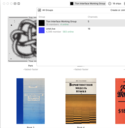Version 3
Lightning talk: Designing a communal computing interface
The top of the peer-to-peer stack

How does a full peer-to-peer stack change how we organise and present user interfaces? If the PC was a 1970s desk for single-player computing, what's the right way to think of the way we actually use networks: communally? Matilde Park presents some findings from working on Urbit, an open source project tackling a peer-to-peer internet from scratch.
When we talk about decentralisation as a movement, we often focus on the principles of cypherpunks and hackers; we describe it as a movement away from central command structures with imbalanced power dynamics; freely and totally owning your hardware, sharing what you know with others, constructing the world in a direct and transparent way.
However, I think it has even more power than that. I think it can completely change how we use computers and where we fit them into our lives. I’d like to posit that decentralisation necessitates rethinking a lot of the ways people interact with computers -- and that the interfaces we use everyday are themselves relics of a creeping, inevitable centralisation in place since the 1970s.
As I work on Urbit as a userspace developer, I've found that we've come to some conclusions about how to discuss peer-to-peer operating systems — in ways that are agnostic to any stack that designs itself for seamless transitions between participating in peer swarms, and everyday, individual computing.
Info
Day:
2019-12-30
Start time:
15:15
Duration:
00:15
Room:
CDC - Stage
Track:
Stage
Links:
Files
Concurrent Events
Speakers
| Matilde Park |